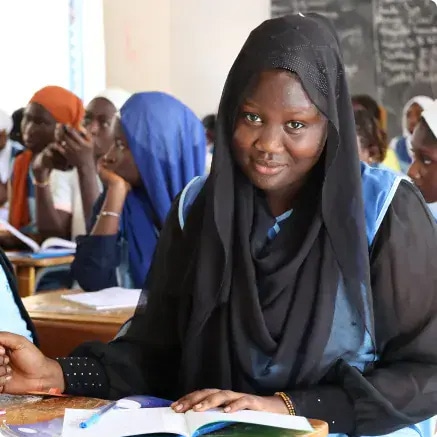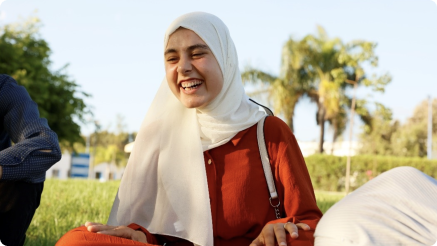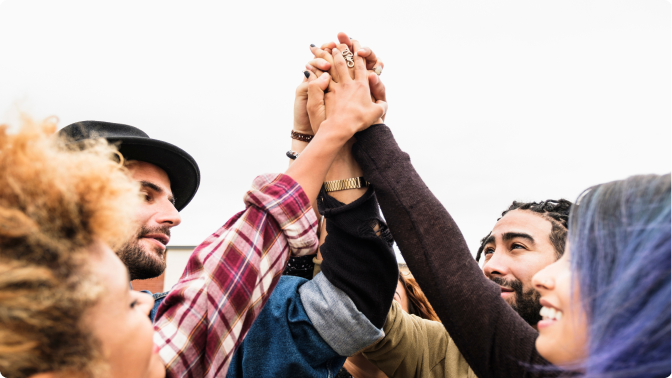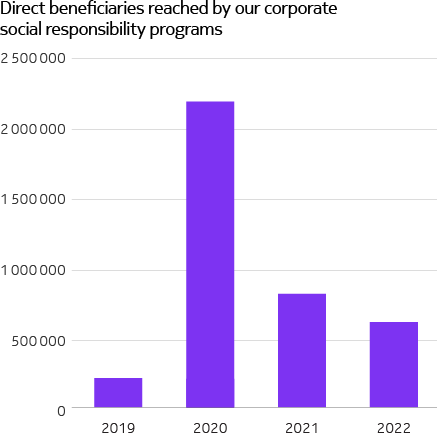Our approach to
corporate social responsibility

Supporting informed public policies for digitalization and sustainable development
We believe that connectivity and digitalization can have a key role to play as an enabler, unlocking economic opportunity and growth and facilitating access to work, education, healthcare and other public services. This belief motivates our support for policies that encourage broadband rollout and adoption and the digital transformation of society and industry. At Nokia, we collaborate with governments, regulators, international organizations, trade associations, industry peers and academia to inform effective policy making and support the development of the best policy framework for sustainable and inclusive digitalization.
Nokia engages with policymakers and regulators transparently and constructively. We offer our expertise on trusted and reliable international connectivity, on the security of digital infrastructures, on a regulatory regime that facilitates network rollout and other digital policy endeavors, on best policy frameworks unlocking innovation, on improving the resilience of economies and their critical infrastructure (e.g. energy grids) and on the most effective regulations for sustainability (e.g. forced labor regulation or due diligence in supply chains). Nokia’s experts explain roadmaps toward 6G in several parts of the world. We advise on spectrum for broadband, including through our participation in the World Radiocommunication Conference 2023 in Dubai.
Our guidelines for dealing with government officials always apply, regardless of the employee’s role and the purpose or frequency of interaction. They also apply to interactions with employees of state-owned companies and other governmental customers. The basic guidance for interaction with a government official is laid down in our Code of Conduct. We do not participate in the political or electoral process through direct donations to political groups.
Our approach to corporate social responsibility
Our Corporate Social Responsibility activities are divided into corporate, key regional, and local programs. Our corporate level programs are centrally managed and in 2023, focused on four key themes:
- Increasing digital inclusion,
- Climate and environment,
- Inclusion, equality and diversity,
- Disaster relief.
Key regional programs cover programs in India and China, and local community programs are initiated and run by Nokia offices around the world.
In 2023, we invested around EUR 8 million in communities around the world. 85% of the contributions were provided as cash, 1% as employee time and 1% as in-kind non-cash resources. In total, our programs reached 131 041 direct beneficiaries in 2023, as shown in the following graph. A large share of total donations, 53%, was classified under the theme of “digital inclusion through connecting the unconnected and building digital skills.” One of our key digital inclusion targets in 2023 was to harness our technology, capabilities and funds to improve the lives of 1.5 million people through social digitalization projects, digital skills building, and connecting the unconnected or underserved by 2025.
In 2023 we reached 130 832 direct beneficiaries through social digitalization projects, building digital skills, connecting the unconnected or underserved, and improving inclusion, equity and diversity. This year, we saw the finalization of some programs and the initial launch of new programs, which both led to the total number of direct beneficiaries being lower than in 2022.
Women, students and minority groups were the largest beneficiary groups.
Our corporate social responsibility programs
We support programs that have a long-term impact and create a sustainable future platform in target communities while being aligned with the UN SDGs.
Finland
Nokia and UNICEF Finland announced a new program in 2023 that aims to help bridge the digital divide and provide a dedicated digital education in select parts of Senegal. The work also includes upgrading equipment and connectivity in the target schools, and the expected beneficiaries are both teachers and middle school children in underserved areas. The program was launched in October 2023 at an event with UNICEF Senegal, Senegal’s Ministry of Education and the Embassy of Finland in Senegal.
Vietnam
UNICEF Vietnam and Nokia are looking to expand digital learning opportunities for marginalized students in Lao Cai Province in Viet Nam. The pilot program includes improving connectivity in schools, and increasing digital skills among teachers, school managers and administrators. The intent is to improve teaching and learning outcomes for students and increase their digital skills and transferable skills. The beneficiaries of the program are set to include approximately 1200 teachers, school managers and administrators who would benefit directly from the trainings and approximately 2300 students who would benefit from the training program involving digital and transferable skills.
Philippines
In the Philippines, we have launched a new two-year program that aims to support the Department of Education in strengthening the alternative learning for out-of-school adolescents and youth. The program will directly benefit around 4,500 Filipino adolescents and young people (16–24 years). It aims to improve the learners’ opportunities to get employment or enter training by creating a new competence-based assessment and micro-certification to demonstrate the learners’ skills and knowledge, and by improving and enhancing teaching and learning through ICT. This includes making online learning material available offline, providing communication devices and teacher training, and developing monitoring and evaluation mechanisms and tools.
Morocco
At the same time, we continued our program with UNICEF in Morocco. The objective of this social innovation and entrepreneurship program is to empower less advantaged young people (15–24 years), particularly girls, to become resilient and increasingly productive through (self) employment and active engagement with their own communities. The program’s training for mentors, environmental skills sessions, and social innovation bootcamps equip young people with life and employment skills, as well as provide resources to help them identify problems and design solutions for the local community. In 2023 the program reached 3928 people with activities like mentor training, awareness-raising sessions, regional and national social innovation bootcamps, mentoring, project or business incubation and digital skills training. The program supports young people’s own business ideas.
Additional collaboration
In 2023 we also renewed our collaboration with UN Women with a private sector contract. The scope addresses communities in five Nokia regions with employment initiatives focusing on the economic empowerment of women. During 2023 we also executed our own women leadership program "Action for Leadership" in collaboration some of our customers.

Ndiarka Diagne school in Guédiawaye
©Massamba Fall

©UNICEFMAROC

Biodiversity
Further information on our environment programs.
Nokia supporting Ukraine
Nokia has donated EUR 1 million to UNICEF to help support its humanitarian work in Ukraine, which is focused on the critical needs of children and families. In addition, we have worked with UNICEF to provide a platform for employee fundraising. Thanks to the generosity of Nokia colleagues, we were able to donate a further EUR 33,000 of Nokia employee donated funds to Ukraine through an employee fundraising campaign website. Nokia has also committed to providing 5,000 Beacons to Ukraine to provide Internet access to shelters in schools.
Selected regional and community programs
India
Our corporate social responsibility initiatives in India are developed and implemented through meaningful partnerships with key stakeholders including national, state and local governments, NGOs and, most significantly, communities across nine states, by engaging with them and prioritizing their needs.
Our flagship initiative, Smartpur, was developed to revolutionize access to livelihood opportunities, healthcare, financial inclusion, education and governance for rural communities by utilizing the transformative power of technology.
Smartpur is a digital village ecosystem project aimed at integrating technology into the daily lives of people living in remote villages. Using digital connectivity technology, the project intends to empower local entrepreneurs and provide them with facilities to make services accessible at the village level through Smartpur centers.
In 2023 we supported Smartpur centers in 350 villages across India and the number of direct beneficiaries reached in 2023 is estimated to be 119795. To find out more, you can read Pekka Lundmark's insight on the Smartpur project in India, demonstrating that the faster digitalization is rolled out, the more people will benefit.
Additionally, in our effort to support the productive employment, capacity development and skilling of India’s youth, we have partnered with the Telecom Sector Skill Council (TSSC) to establish a center of excellence that offers certified training in futuristic and in-demand job roles in 5G and IoT. This builds awareness and boosts the availability of skilled manpower for the telecommunications industry.
Read more about our CSR activities in India in our latest India CSR report.

China
In China our employees launched 13 volunteering/charity programs across the country. In total, 207 Nokia employee volunteers in China contributed over 1,000 hours of volunteer service, benefiting over 5,890 people. The programs focused on, for example, coaching girl students in ICT to improve future job prospects, a kids tech summer camp with Nokia experts, and regular online courses for children in remote mountain regions. Nokia also continued the Ninglang Partnership Program – Nokia’s flagship social impact program in China. The program includes developing smart classrooms, student scholarships and teacher skills as part of the Partner-Up sponsorship program to support the education of children from poorer backgrounds.

Community based programs and volunteering
Our volunteering guidelines and supplemental Standard Operating Procedures provide guidance to our employees on charitable sponsorships and donations as well as volunteering activities. All employees are permitted two days per year from their paid working time to engage in volunteer work.
A snapshot of previous key social programs
Local community engagement
Our employees across our sites are active in organizing activities to support and engage with the communities around them. They carry out acts of support throughout the year through humanitarian and crisis aid projects, such as donating medical material and used IT equipment, collecting and donating toys, clothes and other essential goods.
Find below a snapshot of some of our previous community activities:
Nokia was gold sponsor for ChariTrees Singapore in support of three charities - SOS Samaritans of Singapore, SPD Serving People with Disabilities and #Engage initiative by The Rice Company Ltd. Samaritans of Singapore (SOS) carries out suicide prevention, intervention and postvention services. The SPD seeks to develop the potential and enable people with disabilities of all ages to be as independent and self-reliant as possible. TRCL’s #ENGAGE initiative provides vulnerable children with digital devices and digital-art programs to equip them with know-how and creative skills.
Under collaboration between Nokia Indonesia, Indosat Ooredoo Hutchinson (IOH) and the Institute of Technology Surabaya (ITS) and with the collaboration of Nokia sales team, StrongHer and the ESG team, we successfully conducted: Nokia ESG program for ITS students: Educational and research incentive of laptops distribution for the development of youth in 5G Experience Center, alignment of the local content process, Industry 4.0, and to lead the ICT development in Indonesia. It included forum discussions as well as a Nokia Technology Day with more than 200 students attending
In October 2022, Nokia Korea held an event, where about 40 people voluntarily planted trees at DMZ area in Paju. DMZ stands for DeMilitarized Zone that has seen war, a border between South and North Korea and owes its varied biodiversity to its geography, which crosses mountains, prairies, swamps, lakes, and tidal marshes. Engaging with our communities on the ground during the event, around 200 trees were planted along with donations to the DMZ area. The trees will be cared for by an organization supported by the Korea Ministry of Environment.
Nokia sponsors an NGO, SUKA Society to create greater access to education for Orang Asli children, by enabling digital access and connecting with teachers. Sponsorship will cover two teachers' monthly stipend for one year, expenses to develop and train teachers to use the syllabus (with the internet connectivity for 12 months for 2 schools),and funds to purchase IT equipment and school supplies. Teacher training planned between February and March 2023 with a CMT visit to the training site.
In 2022, Nokia volunteers supported Chunghwa Telecom (CHT) and its ESG activity - 5G Plastic Free Festivals. The initiative aims to reduce plastic usage and marine debris and effectively raise public awareness of environmental sustainability. The CHT Foundation arranged a series of activities to promote the concept, including volunteer activities to clean major beaches nationwide, and sponsoring the famous Paper Windmill children troupe performing environmental education shows for kids in Taichung and Kaohsiung. We shared our corporate ESG targets, progress, and commitments and the concept of the circular economy through the Design for Environment case example. Through the introduction of post-consumer recycled (PCR) plastic, Nokia has successfully used PCR plastics in the production of ONT products.
Nokia sponsored Taiwan Mobile (TWM) “Solar for Good” charity program. Nokia was one of the main energy partners for the sixth Solar Power for Good collaboration in 2022. The 2022 beneficiary was the Kanner Foundation of Taiwan, which aims to develop supporting systems for individuals with Kanner Syndrome since 2004.
Acting together to improve opportunities in technology for underrepresented communities
Nokia launched a scholarship support program aimed at providing greater opportunities for underrepresented communities in the technology industry. Working together with digital talent transformation platform Udacity and the Blacks in Technology Foundation (BiT Foundation), the initiative offers more than 300 tech scholarships, with a focus on underrepresented students and career changers.
During the application period of August – September 2021 we received nearly 26,000 applications. After pre-selection, we invited prospective candidates to take part in a 2-month challenge course which acted as an introductory program. Based on the motivation and learning shown during the challenge course, we finally made the selection of 302 scholarship winners who started their Nanodegrees in January 2022 and completed in June 2022.
26 000
We received nearly 26 000 applications
302
Nanodegree scholarships awarded
Connecting the unconnected to inclusive digital learning in Kenya
Between 2018-2020 we worked with UNICEF Finland and UNICEF Kenya to build a multi-partner collaboration to bring internet connectivity and inclusive digital learning to Kenyan schools in rural and disadvantaged urban areas across the country. The program particularly focuses on girls and children with disabilities.
The first 10 schools across Kenya were successfully connected in late 2020 using Nokia Fixed Wireless Access solution in collaboration with local Mobile Operators. The solution connects more children in a fast and efficient way with high-speed and high-capacity broadband needed for remote digital education.
Moving from a CSR pilot to commercial rollout, we have together with UNICEF and Safaricom connected 90 primary schools to the Internet across Kenya during 2021.
Read more about the scaling up of Kenyan school connectivity here.
Read more about student stories and earlier achievements of the program.
Watch the video with highlights from the program journey.
Key achievements 2018-2021
- 10 - First schools connected and used by all 1363 students to access digital learning. Read more.
- +42 000 - girls reached directly through the program
- 450 - children with disabilities benefited from the program
- +86 000 - children in total reached directly through the program
- 500 - Teachers trained in the use of digital materials, out of which 290 are female
- +32000 - more students connected to the internet as we connected a further 90 schools together with Safaricom and UNICEF in 2021
Program awards
Changing Lives Award
We support programs that have a long-term impact and create a sustainable future platform in target communities while being aligned with the UN SDGs.
Nokia and UNICEF were recognised in May 2021 with the Changing Lives Award at East Africa Com. This award recognizes innovation where ICT meets socio-economic development and digital inclusion. The award celebrates a product, initiative or social enterprise that is having a life-changing impact on individuals or communities in East Africa.
WSIS 2021 Champions prize winner
We support programs that have a long-term impact and create a sustainable future platform in target communities while being aligned with the UN SDGs.
The Nokia UNICEF shared value project was named in May 2021 as one of the WSIS Champions by the World Summit on Information Society forum. WSIS is a two-phase United Nations (UN) summit initiated (since 2003) to create an evolving multi-stakeholder platform aimed at addressing the issues raised by information and communication technologies (ICTs) through a structured and inclusive approach at the national, regional and international levels. The World Summit on the Information Society Forum 2021 represents the world's largest annual gathering of the ‘ICT for development’ community. The WSIS Forum is co-organized by ITU, UNESCO, UNDP and UNCTAD.
Improving healthcare outcomes in Indonesia with UNICEF
Key achievements
- +2.5 million - direct beneficiaries between 2017 and 2021
- +500 000 - children reached using mobile technology
- +900 000 - women reached using mobile technology
- +1000 - health workers trained to use the new technology to improve delivery of services during 2019-2021
- 40 - government planning officers were trained to update and maintain the SDGs and Health Development
Covid-19 donations
Amidst the outbreak of the global pandemic, we set up a Global Donation fund to rapidly support our communities in need. Through the fund, we engaged with local branches of NGOs such as World Vision, UNICEF, Red Cross, and several local hospitals and clinics, in a total of 48 countries.
In India, Nokia supported affected households in Smartpur villages in partnership with Save the Children India (Bal Raksha Bharat) across 160 villages. Migrant populations were provided with essentials with the support of Samridhdhi Trust. Nokia also supported the State Disaster Management Authority of Tamil Nadu by contributing to their Covid relief corpus during their time of need.
At this time, Nokia further supported hospitals with procuring medical equipment such as oxygen plants, Ventilators, ICU machines, PPE Kits, dialysis machines- all of which was essential to support the overburdened healthcare system of the country
Greenlight for girls
We worked together with international NGO greenlight for girls (g4g) over a number of years. The g4g days are all about showing girls that anything is possible, through interactive workshops held by g4g at Nokia locations around the world, where employee volunteers joined as mentors. By end of 2019, our collaboration with g4g had reached a total of 4964 girls around the world.
Long-term collaboration brings long-term benefits to children in Myanmar
The 5 year collaboration between Nokia and Save the Children produced two major projects, “The Best Start” project from 2015 to 2017 and the “Making Change Happen together” project from 2017 to 2019. Over those 5 years Save the Children and Nokia worked in the communities of three townships to improve early learning and development opportunities for the most marginalized children. A major achievement of this long-lasting partnership was the establishment of 60 community-managed early childhood care and development (ECCD) facilities and 33 kindergarten classrooms




